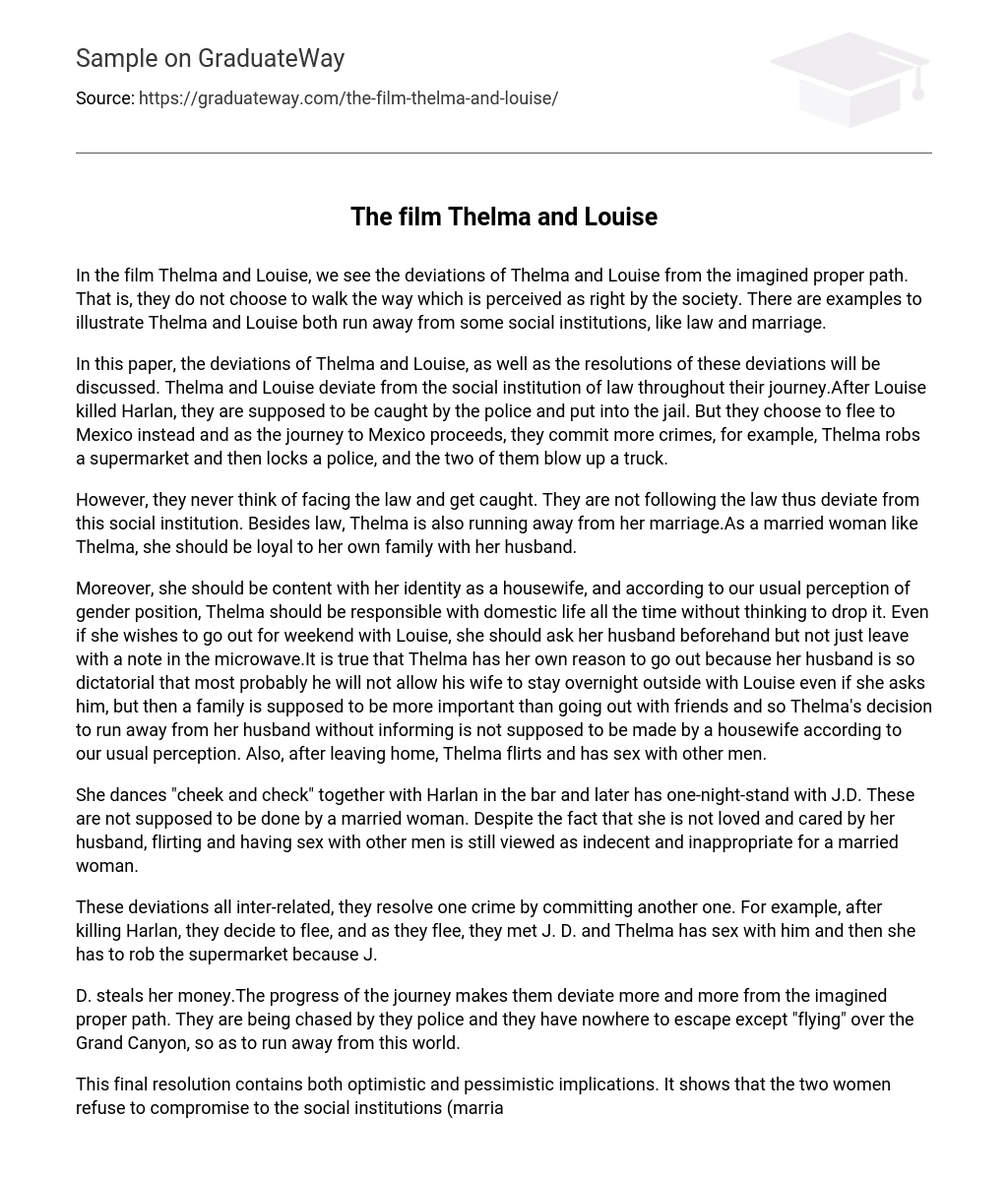In the movie Thelma and Louise, we witness how Thelma and Louise defy societal norms by straying from the expected path. They consciously decide not to conform to the standards that society deems correct. Numerous instances within the film demonstrate how Thelma and Louise both reject established social institutions, such as law and marriage.
This paper explores the deviations of Thelma and Louise and their subsequent resolutions. Throughout their journey, Thelma and Louise defy the norms of social law. Although they were expected to be apprehended and incarcerated after Louise’s act of killing Harlan, they opt to escape to Mexico instead. As they progress towards Mexico, they further engage in criminal activities, such as Thelma’s robbery of a supermarket and her subsequent confinement of a police officer. Moreover, the two women even detonate a truck.
However, individuals fail to acknowledge the potential consequences of defying the law and getting caught. By disregarding legal regulations, they deviate from accepted societal standards. Alongside her disregard for the law, Thelma is also evading her responsibilities as a spouse. As a married woman similar to Thelma, it is crucial to prioritize loyalty towards one’s husband and family.
Moreover, it is expected that Thelma will conform to the traditional role of a housewife. In accordance with societal norms, she is anticipated to prioritize her household responsibilities and not consider abandoning them. Even if she desires to spend a weekend with her friend Louise, she must obtain her husband’s permission rather than leaving a note in the microwave. Despite having valid reasons for wanting to leave, such as dealing with her controlling husband who likely would not allow an overnight stay with Louise, family obligations should come before socializing with friends. Consequently, it is atypical for a housewife to flee from her husband without informing him. Additionally, Thelma partakes in flirtation and engages in sexual encounters with other men after leaving home.
Engaging in “cheek and check” dancing with Harlan at the bar and later having a one-night-stand with J.D., she partakes in actions that are deemed unacceptable for a married woman. Despite not receiving love and attention from her husband, flirting and engaging in sexual activities with other men are still seen as immodest and unsuitable for someone who is married.
These deviations are all interconnected, as they solve one crime by committing another. For instance, following the murder of Harlan, they opt to escape, and while doing so, they encounter J. D., whom Thelma engages in sexual activity with. Consequently, she is compelled to rob the supermarket.
D. steals her money. The progression of the journey causes them to stray further and further from the intended path. They are being pursued by the police and their only means of escape is to “fly” over the Grand Canyon in order to elude this reality.
This ultimate resolution presents both hopeful and negative consequences. It reveals that the two women adamantly reject compromising with the societal institutions of marriage and law that caused them immense suffering. It never occurred to them to return home and risk getting arrested. Instead, they opt for a path that allows them to completely break free from all limitations.
The flying car creates the perception that Thelma and Louise are not deceased; rather, they are soaring away from society to reclaim their dignity. Nevertheless, despite harboring aspirations of residing in a hacienda and securing employment at a club, both individuals are unable to pursue these dreams due to their outlaw status in an unsupportive society. Although flying over the Grand Canyon facilitates their escape from this inhospitable world, the challenges they have encountered persist without a genuine resolution.





